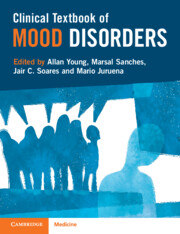Book contents
- Clinical Textbook of Mood Disorders
- Clinical Textbook of Mood Disorders
- Copyright page
- Contents
- Contributors
- Foreword
- Chapter 1 Mood Disorders in the Twenty-First Century
- Chapter 2 The Classification of Mood Disorders and the Unipolar/Bipolar Dichotomy
- Chapter 3 Epidemiology of Mood Disorders across the Life Span
- Chapter 4 The Mood Spectrum Concept: Clinical Implications
- Chapter 5 Clinical Screening for Unipolar and Bipolar Disorders
- Chapter 6 The Socioeconomic Costs of Mood Disorders
- Chapter 7 Mood Disorders and Suicide
- Chapter 8 Mood and Psychosis: Limits and Overlapping between Psychotic Disorders and Mood Disorders
- Chapter 9 Transcultural Issues in Mood Disorders
- Chapter 10 Mood Disorders and Stress-Related Disorders
- Chapter 11 The Common Ancestors of Anxiety and Depression: Comorbidity as a Cognitive, Behavioural, Neural and Cellular Phenotype, and Current Evidence for Photobiomodulation as a Novel Treatment
- Chapter 12 Mood Disorders and Comorbid Substance Use Disorders
- Chapter 13 Mood Disorders with Attention-Deficit/Hyperactivity Disorder, Impulse Control Disorders, or Borderline Personality Disorder
- Chapter 14 Phenomenological Psychopathology of Mood Disorders
- Chapter 15 Brain Imaging in Mood Disorders: Pathophysiological Significance and Clinical Perspectives
- Chapter 16 Inflammation and Metabolic Issues in Mood Disorders
- Chapter 17 Genetics of Mood Disorders
- Chapter 18 Management of Major Depressive Disorder: Basic Principles
- Chapter 19 Treatment-Resistant Depression: Pharmacological Approach
- Chapter 20 An Update on the Treatment of Manic and Hypomanic States
- Chapter 21 The Burden of Bipolar Depression
- Chapter 22 The Management of Neurocognitive Impairment in Mood Disorders
- Chapter 23 Progress in Biomarkers to Improve Treatment Outcomes in Major Depressive Disorder
- Chapter 24 Pharmacogenomics and the Management of Mood Disorders
- Chapter 25 Mood Disorders: Therapeutic Challenges in the Medically Ill Patient
- Chapter 26 The Treatment of Mood Disorders in Children and Adolescents
- Chapter 27 Considerations about the Treatment of Mood Disorders in Elderly Patients
- Chapter 28 Evidence-Based Psychological Interventions for Bipolar Disorders
- Chapter 29 Evidence-Based Psychotherapeutic Approaches for Depressive Disorders
- Chapter 30 Rating Instruments for Mood Disorders in Clinical Practice
- Chapter 31 Service Delivery for Mood Disorders
- Index
- References
Chapter 19 - Treatment-Resistant Depression: Pharmacological Approach
Published online by Cambridge University Press: 16 May 2024
- Clinical Textbook of Mood Disorders
- Clinical Textbook of Mood Disorders
- Copyright page
- Contents
- Contributors
- Foreword
- Chapter 1 Mood Disorders in the Twenty-First Century
- Chapter 2 The Classification of Mood Disorders and the Unipolar/Bipolar Dichotomy
- Chapter 3 Epidemiology of Mood Disorders across the Life Span
- Chapter 4 The Mood Spectrum Concept: Clinical Implications
- Chapter 5 Clinical Screening for Unipolar and Bipolar Disorders
- Chapter 6 The Socioeconomic Costs of Mood Disorders
- Chapter 7 Mood Disorders and Suicide
- Chapter 8 Mood and Psychosis: Limits and Overlapping between Psychotic Disorders and Mood Disorders
- Chapter 9 Transcultural Issues in Mood Disorders
- Chapter 10 Mood Disorders and Stress-Related Disorders
- Chapter 11 The Common Ancestors of Anxiety and Depression: Comorbidity as a Cognitive, Behavioural, Neural and Cellular Phenotype, and Current Evidence for Photobiomodulation as a Novel Treatment
- Chapter 12 Mood Disorders and Comorbid Substance Use Disorders
- Chapter 13 Mood Disorders with Attention-Deficit/Hyperactivity Disorder, Impulse Control Disorders, or Borderline Personality Disorder
- Chapter 14 Phenomenological Psychopathology of Mood Disorders
- Chapter 15 Brain Imaging in Mood Disorders: Pathophysiological Significance and Clinical Perspectives
- Chapter 16 Inflammation and Metabolic Issues in Mood Disorders
- Chapter 17 Genetics of Mood Disorders
- Chapter 18 Management of Major Depressive Disorder: Basic Principles
- Chapter 19 Treatment-Resistant Depression: Pharmacological Approach
- Chapter 20 An Update on the Treatment of Manic and Hypomanic States
- Chapter 21 The Burden of Bipolar Depression
- Chapter 22 The Management of Neurocognitive Impairment in Mood Disorders
- Chapter 23 Progress in Biomarkers to Improve Treatment Outcomes in Major Depressive Disorder
- Chapter 24 Pharmacogenomics and the Management of Mood Disorders
- Chapter 25 Mood Disorders: Therapeutic Challenges in the Medically Ill Patient
- Chapter 26 The Treatment of Mood Disorders in Children and Adolescents
- Chapter 27 Considerations about the Treatment of Mood Disorders in Elderly Patients
- Chapter 28 Evidence-Based Psychological Interventions for Bipolar Disorders
- Chapter 29 Evidence-Based Psychotherapeutic Approaches for Depressive Disorders
- Chapter 30 Rating Instruments for Mood Disorders in Clinical Practice
- Chapter 31 Service Delivery for Mood Disorders
- Index
- References
Summary
There is no consensus for the concept of treatment-resistant depression (TRD). Although some authors argue considering TRD a depression subtype is not supported by evidence, its impact on the individual and society is clear. This chapter discusses the concept of TRD, presents evidence about its neurobiology, pharmacological interventions, and describes drugs currently under investigation. Among the pharmacological strategies to manage TRD, guidelines include increasing the antidepressant dose, switching to another new antidepressant, combining two or more antidepressants, and augmentation of the current medication. Several new components have been investigated for TRD targeting, for instance, the glutamatergic system, inflammatory system, the opioid system, the cholinergic system, dopaminergic system, and neurotrophin signaling. Finally, machine-learning techniques using clinical and neurobiological data provide promising information about treatment outcomes prediction that could change the current approach to a more personalized one.
- Type
- Chapter
- Information
- Clinical Textbook of Mood Disorders , pp. 193 - 205Publisher: Cambridge University PressPrint publication year: 2024

